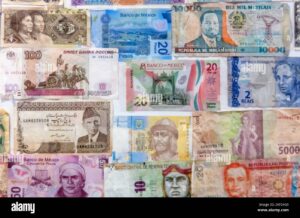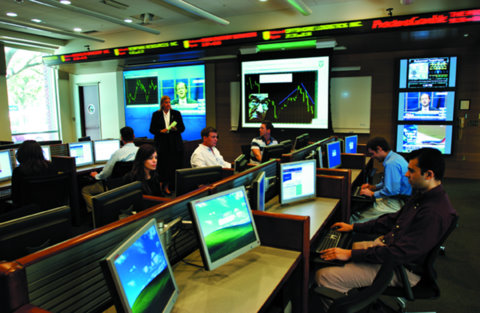The foreign exchange market is the largest, most liquid, and arguably the oldest globally. About $5 trillion in forex transactions are made worldwide on various trading rooms and exchanges daily. Some of these markets are regulated by national authorities, such as forex transactions on futures exchanges, with large numbers of individual traders. Other forex trades are done off the exchange in bank trading rooms and are more commonly used by commercial customers (institutions, banks, manufacturers) in large denominations.
There are three ways to trade forex: the spot market, the forwards market, and the futures market. The spot market is based on current prices. Here, one party agrees to deliver a currency amount to another at the agreed-upon exchange rate value. When trades are settled, a cash payment in the actual currency is paid within a few days.
In the forward and futures markets, trades are made in cash (for example, forex trades at the Chicago Mercantile Exchange are traded in US dollars) instead of using the actual foreign currency that occurs in the spot market. 
Forex futures have specific standardized details in future markets, including contract size, delivery and settlement dates, and minimum price changes. The exchange is a counterparty to all trades and provides clearance and settlement. The forward market allows traders to make customized deals based on size, delivery features, and settlement procedures. Commercial traders primarily use it.
In any forex trade, there is a bid and ask price for the purchase or sale of any listed currency. The difference between the bid and the ask is called the spread, and it is determined by supply and demand.
Who Trades Forex?
In a global, commercially interlinked economy, anyone who does business outside their own country or wants to speculate in currency valuations is a candidate to trade forex.
Commercial users include manufacturers or buyers producing goods in another country who want to pay for that product now or in the future. Suppose their delivery date is a year away, and they pay for their order today. In that case, they can hedge that purchase price by buying the foreign currency, which has an expiration date closest to the delivery date, which in some cases can be up to five years in the future. Many hedging strategies exist in the futures and forward markets, but their shared goal is risk management and currency price stability over time.
Individuals who want to speculate in forex can trade in spot and futures markets. With the advent of internet forex trading, access was opened to anyone who qualifies for a brokerage account.
How the Internet Allows Investors to Trade FX
The most significant advance in the history of forex trading was the internet. Online brokerage firms specializing in forex trading have opened this asset class to a broader audience than ever before. Some online forex brokers allow traders to speculate in an individual currency. In contrast, others offer pairs trading in currencies (buy on and sell another) that simplifies the execution but not the strategy research to take the position.
For instance, traders can evaluate the interest rate differences in two countries and buy the currency with the higher interest rate while shorting the currency with the lower interest rate. Trading the spread is a common strategy, and some online forex brokers have made this type of pair trading easy and with minimal spreads. Traders should also make price comparisons (spreads and commissions), evaluate the broker’s reputation, minimum account size, customer education resources, and know the required margin interest rates.
Many online forex brokers also provide charting and some analytical tools, online client support, and 24-hour access. Some firms are rated as better for novice or sophisticated traders.
Forex brokers also offer a variety of ways to trade forex: cash currencies, options, futures, indexes, spreading between currencies, and even cryptocurrencies.
Beware of Buying on Margin
Buying on margin involves risk when available because you borrow money from the broker and have to pay interest on this loan. While it has the effect of magnifying your profits, it also can magnify your losses. If you are using the futures market to trade and you receive a margin call when your position loses money, you have to meet the margin call with your broker by the start of trading the next day. If you miss that payment, your position is closed out at a loss. This money combined lets you make more significant investments for potentially more enormous profits, but poor investments mean the losses are more important, too.
Risk and Reward of Forex Trading
Individuals who want to speculate in forex have more options to trade today than ever before.
Individuals interested in country-specific political and economic events, such as interest rate moves, changes in imports and exports, environmental events, and employment rates, can develop a strategy to sell or buy a specific foreign currency. Then, they can execute this strategy using an online forex broker or on a futures exchange.
Both options and futures on foreign currencies are available, which means individuals can take a position using leverage. However, leverage magnifies profits and losses, so know the risks, especially if trading on margin.
Forex traders should also deal with regulated futures exchanges and brokerage firms. Since this is a global trading market, it is worth noting that forex trading is almost entirely unregulated, except in certain countries. This means that investors should ensure they are protected if a brokerage firm becomes insolvent or there are irregularities in a trading account.
There is also the risk of trading on margin. Margin involves using money borrowed from the brokerage firm. It must be repaid with interest by a specified date if a position becomes unprofitable. If not, your position can be closed out.











